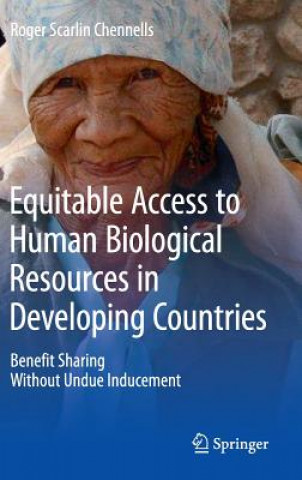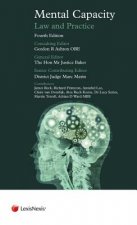
Kód: 09296328
Equitable Access to Human Biological Resources in Developing Countries
Autor Roger Chennells
The main question explored by the book is: How can cross-border access to human genetic resources, such as blood or DNA samples, be governed in such a way as to achieve equity for vulnerable populations in developing countries? Th ... celý popis
- Jazyk:
 Angličtina
Angličtina - Vazba: Pevná
- Počet stran: 197
Nakladatelství: Springer International Publishing AG, 2015
- Více informací o knize

Mohlo by se vám také líbit
-

Linkers and Loaders
1576 Kč -

Art of John Harris: Volume II - Into the Blue
944 Kč -

Excel 2021
226 Kč -

Moderne. Ikonografie. Fotografie | Modernism. Iconography, Photography (Band 1, dt. + engl.)
907 Kč -

Envisioning Islam
855 Kč -

You Need a Budget: The Proven System for Breaking the Paycheck-To-Paycheck Cycle, Getting Out of Debt, and Living the Life You Want
540 Kč -

Conviction: The Untold Story of Putting Jodi Arias Behind Bars
318 Kč -

Subjectivity in a Second Language
2857 Kč -

Philosophy of Language
4283 Kč -

Microeconomics for MBAs
3573 Kč -

Overlord, Vol. 2
436 Kč -

Rebel
276 Kč -

The Five Dysfunctions of a Team
570 Kč -

VOLCANO SANTORINI (paper Back)
524 Kč -

SOLO TIME STR 2VLAETLISIENNICKI
188 Kč -

Leonard Bernstein
436 Kč -

CRONOMETRADOS : C MO EL MUNDO
570 Kč -

Antología de César Vallejo
312 Kč -

Fatmagülün Sucu Ne
277 Kč -

Kredki szkolne Bambino drewniane trójkątne 24 kolory
153 Kč -

sociologie de la famille
4771 Kč
Darujte tuto knihu ještě dnes
- Objednejte knihu a zvolte Zaslat jako dárek.
- Obratem obdržíte darovací poukaz na knihu, který můžete ihned předat obdarovanému.
- Knihu zašleme na adresu obdarovaného, o nic se nestaráte.
Více informací o knize Equitable Access to Human Biological Resources in Developing Countries
Nákupem získáte 329 bodů
 Anotace knihy
Anotace knihy
The main question explored by the book is: How can cross-border access to human genetic resources, such as blood or DNA samples, be governed in such a way as to achieve equity for vulnerable populations in developing countries? The book situates the field of genomic and genetic research within global health and research frameworks, describing the concerns that have been raised about the potential unfairness in exchanges during recent decades. Access to and sharing in the benefits of human biological resources are aspects not regulated by any international legal framework such as the Convention on Biological Diversity, which applies only to the exchange of plants, animals and microorganisms, as well as to associated traditional knowledge. Examples of genetic research perceived as exploitative are provided in order to illustrate the legal vacuum concerning the global governance of human genetic resources. The main conclusions drawn from the legal and ethical analysis are:§§- Benefit sharing is crucial in order to avoid the exploitation of developing countries in human genetic research.§§- With functioning research ethics committees, undue inducement is less of a concern in genetic research than in other areas of medical research (e.g. clinical trials).§§- Concerns remain over research involving indigenous populations; accordingly, recommendations are provided.§§In drawing these conclusions, the book addresses in detail a highly pressing topic in global bioethics and international law. In this regard, it combines bioethical arguments with jurisprudence, in particular with reference to the law of equity and the legal concepts of duress (coercion), unconscionable dealing, and undue inducement.§
 Parametry knihy
Parametry knihy
Zařazení knihy Knihy v angličtině Law Laws of Specific jurisdictions Social law
3289 Kč
- Plný název: Equitable Access to Human Biological Resources in Developing Countries
- Podnázev: Benefit Sharing Without Undue Inducement
- Autor: Roger Chennells
- Jazyk:
 Angličtina
Angličtina - Vazba: Pevná
- Počet stran: 197
- EAN: 9783319197241
- ISBN: 331919724X
- ID: 09296328
- Nakladatelství: Springer International Publishing AG
- Hmotnost: 4557 g
- Rozměry: 235 × 155 × 244 mm
- Datum vydání: 21. July 2015
Oblíbené z jiného soudku
-

Medical Law: A Very Short Introduction
249 Kč -

Neuroscience and Law
7531 Kč -

Medical Law
1846 Kč -

Horrors of Vaccination Exposed and Illustrated
450 Kč -

Under Observation: The Interplay Between eHealth and Surveillance
4765 Kč -

TASER (R) Conducted Electrical Weapons: Physiology, Pathology, and Law
4111 Kč -

Vaccine Whistleblower
497 Kč -

SGB 2023 Sozialgesetzbuch
473 Kč -

Resocialising Europe in a Time of Crisis
3044 Kč -

Law and Practice Relating to Charities: First Supplement to the Fourth Edition
7557 Kč -

Democratic Foundations of Policy Diffusion
4504 Kč -

Nonclinical Safety Assessment - A Guide to International Pharmaceutical Regulations
5193 Kč -

Encyclopedia of Forensic and Legal Medicine
48813 Kč -

EU Food Law
3552 Kč -

Protest, Property and the Commons
1812 Kč -

Food Law in the United States
4603 Kč -

Medical Device Regulatory Practices
4949 Kč -

Medical Law
1354 Kč -

Pandemics and Ethics
5453 Kč -

Handbook of Research on International Consumer Law
1899 Kč -

Handbook of Neuroethics
30703 Kč -

Media Law
1676 Kč -

Genetic Discrimination
5563 Kč -

FDA Regulatory Affairs
6328 Kč -

Clinical Forensic Medicine
3640 Kč -

Studies In Forensic Psychiatry
880 Kč -

Law and Neuroscience
4106 Kč -

Social protection, growth and employment
950 Kč -

State Registration for Nurses, Part 2
906 Kč -

Lisbon Treaty and Social Europe
3552 Kč -

Human Cloning
918 Kč -

Mental Capacity
5529 Kč -

Human Embryo In Vitro
3242 Kč -

Animal Experimentation
1527 Kč -

Information Technology in Medical Diagnostics
4414 Kč -

Cure for Obamacare
222 Kč -

COVID-19 and the Law
3132 Kč -

European Social Security Law, 6th edition
4032 Kč -

Reform and Perspectives on Social Insurance: Lessons from the East and West
5006 Kč -

Toxic Tort
842 Kč -

Private Foundations
15673 Kč -

Blutzucker Logbuch für Diabetiker
527 Kč -

Antarctic Environmental Protocol and its Domestic Legal Implementation
10693 Kč -

E-Health and the Law
5701 Kč -

Mental Health, Incapacity and the Law in Scotland
6478 Kč -

Cell Phone Use & Health Risks
2994 Kč -

Bvr/Ahla Guide to Healthcare Industry Finance and Valuation
7393 Kč -

Cannabis Revolution(c)
905 Kč -

Equality Act 2010 in Mental Health
1335 Kč
Osobní odběr Praha, Brno a 12903 dalších
Copyright ©2008-24 nejlevnejsi-knihy.cz Všechna práva vyhrazenaSoukromíCookies



 Vrácení do měsíce
Vrácení do měsíce 571 999 099 (8-15.30h)
571 999 099 (8-15.30h)